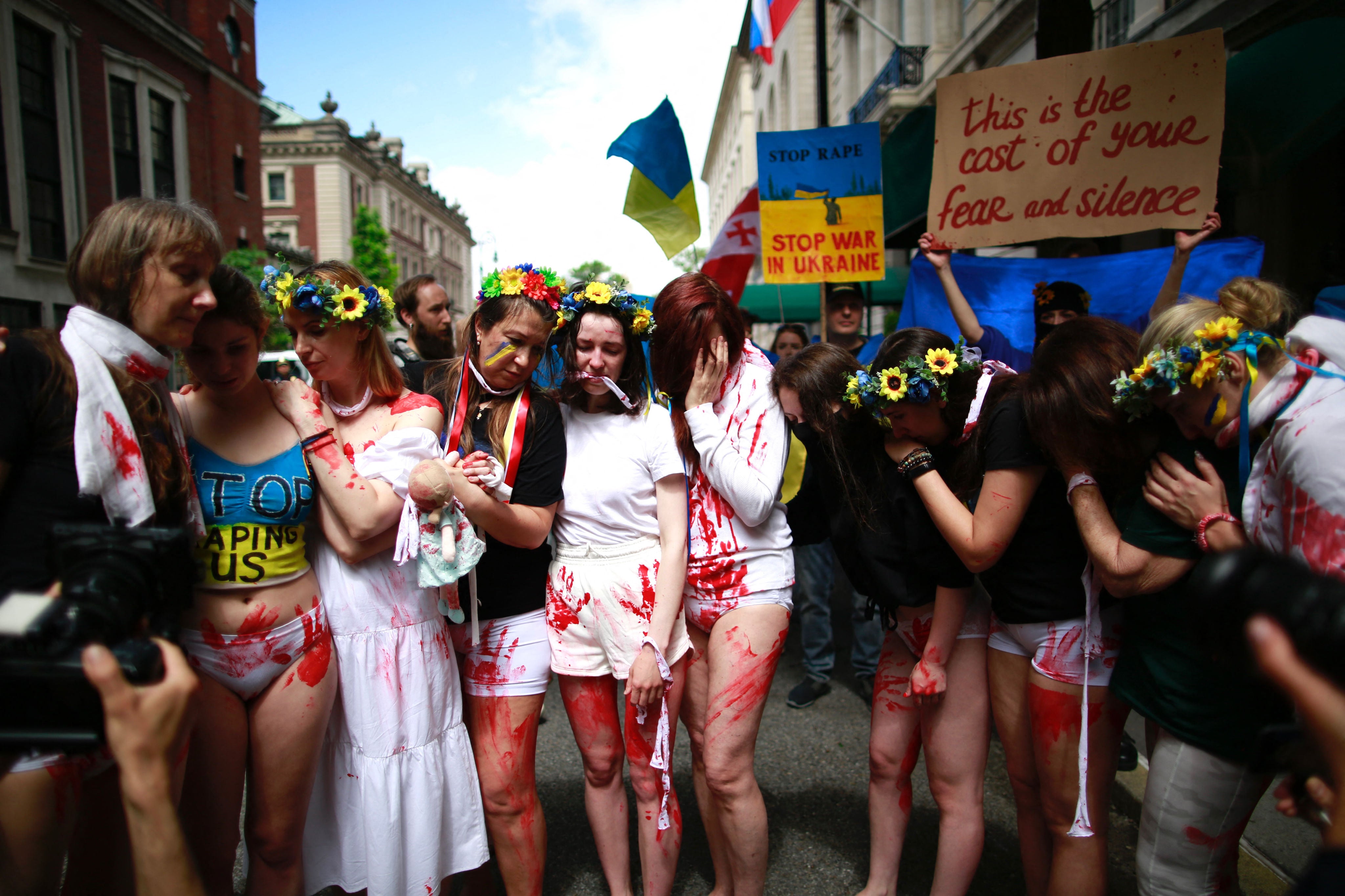We must face the fact that rape is being used as a weapon of war in Ukraine
Failure to address historic injustices makes taking action in Ukraine all the more important


Your support helps us to tell the story
From reproductive rights to climate change to Big Tech, The Independent is on the ground when the story is developing. Whether it's investigating the financials of Elon Musk's pro-Trump PAC or producing our latest documentary, 'The A Word', which shines a light on the American women fighting for reproductive rights, we know how important it is to parse out the facts from the messaging.
At such a critical moment in US history, we need reporters on the ground. Your donation allows us to keep sending journalists to speak to both sides of the story.
The Independent is trusted by Americans across the entire political spectrum. And unlike many other quality news outlets, we choose not to lock Americans out of our reporting and analysis with paywalls. We believe quality journalism should be available to everyone, paid for by those who can afford it.
Your support makes all the difference.The conflict in Ukraine shows that sexual violence is still being used as a weapon of war, terrorising civilian populations.
A mounting body of evidence has demonstrated that summary executions, rape and torture have been used against civilians in areas under Russian control since the Kremlin’s invasion. Despite predictable denials by the Russian authorities of this and other atrocities by its soldiers, there appears to have been little attempt to hide the crimes, implying they may be tolerated, if not ordered, by Russian command.
The psychological violence inflicted by sexual assault is such that it takes a great deal of courage for survivors to acknowledge their suffering, come forward and demand justice. Speaking out itself is a deeply traumatic ordeal. Those who do come forward do not always receive the support they deserve.
The Lai Dai Han, mixed-race children of Vietnamese women who were raped by South Korean soldiers during the Vietnam war, are one of many tragic examples of this. Despite their efforts to gain recognition for many years, their story remains largely untold. For the past four years I have been acting as international ambassador of justice for the Lai Dai Han, as part of a campaign seeking to change this situation and attain justice.
I have had the opportunity to meet members of the Lai Dai Han community and hear their heartbreaking stories firsthand. Often living in remote, rural communities, they are relegated to the margins of society, and many are unable to access education and other essential services.
The Lai Dai Han are socially excluded from their own communities as a result of their dual heritage. Despite the suffering, stigmatisation and setbacks they have faced, 50 years on they are still bravely campaigning for recognition, an independent investigation by the UN and, hopefully, an apology from South Korea. Such an admission would go a long way to helping the now elderly women, and their children, achieve closure and finally heal from their traumatic past.
Failure to address historic injustices faced by victim groups such as the Lai Dai Han makes taking action in Ukraine all the more important. The international community has a moral obligation to give a voice to all victims – past and present – by improving evidence-gathering and pursuing perpetrators by all possible legal means.
Expressing concern about the allegations coming out of Ukraine, Pramila Patten, UN special representative on sexual violence in conflict, stated that we must “ensure accountability as a central aspect of deterrence, prevention and non-repetition”, as “failure to acknowledge and investigate past atrocities is the surest sign that violations will continue unabated”.
Together with military and economic aid, the West and, if we can achieve this, the entire international community must provide humanitarian assistance to safeguard civilians, support survivors’ access to legal and medical services, and work to prevent future atrocities.
The UK has been one of the leading country donors to the Ukrainian crisis, committing nearly £400m for urgent economic and humanitarian support since the invasion and a further £10m Civil Society Fund to support Ukrainian organisations, including those helping victims of conflict-related sexual violence.
In addition, the foreign secretary, Liz Truss, announced the deployment of a team of war crimes specialists, with experts in conflict-related sexual violence, to support the Ukrainian government in gathering evidence and prosecuting war crimes committed by Russian forces. And with the recent launch of the Murad Code in April 2022, providing guidelines to interview survivors of sexual violence to support in evidence-gathering, the UK continues to demonstrate global leadership in the field.
Sexual violence has been virtually ubiquitous in conflicts around the world since records began, and almost certainly before that. The conflict in Ukraine is a harrowing reminder that the practice continues unabated as a tactic of modern-day warfare. But hope rests in the fact that, unlike during the war in Vietnam, today there is growing awareness of this horrific act, and international forces are coming together to oppose it.
To keep up to speed with all the latest opinions and comment, sign up to our free weekly Voices Dispatches newsletter by clicking here
Just last month the UN announced a new framework of cooperation on the prevention and response to conflict-related sexual violence, which seeks to strengthen accountability and combat these horrific crimes. Yet, crucially, we need the global donor community to stand in solidarity with Ukrainian authorities and UN entities to support the framework’s implementation if it is to have a lasting impact.
The 19 June marks the International Day for the Elimination of Sexual Violence in Conflict. This year is also the 10th anniversary since the launch of the British Preventing Sexual Violence in Conflict initiative, and in November the UK will host a much-anticipated and timely global summit on the issue.
Let these significant occasions trigger reflection and renewed global commitment to join forces, ramp up efforts to achieve accountability for all such crimes, realise justice for all victims, and finally put a stop to sexual violence in conflict.
Jack Straw served as British home secretary from 1997 to 2001 and foreign secretary from 2001 to 2006



Join our commenting forum
Join thought-provoking conversations, follow other Independent readers and see their replies
Comments